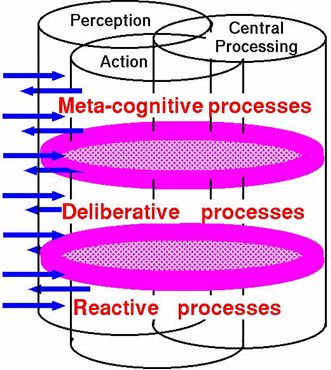 CogAff (Cognition and Affect) cognitive architecture schema, developed by the research group of Aaron Sloman (Honorary professor of artificial intelligence and cognitive science) in the School of Computer Science at the University of Birmingham, Birmingham, UK.
CogAff (Cognition and Affect) cognitive architecture schema, developed by the research group of Aaron Sloman (Honorary professor of artificial intelligence and cognitive science) in the School of Computer Science at the University of Birmingham, Birmingham, UK.
Email: Этот адрес электронной почты защищён от спам-ботов. У вас должен быть включен JavaScript для просмотра.
Website of CogAff | EUCog Wiki profile | http://www.cs.bham.ac.uk/~axs
Site Sloman Meta-Morphogenesis | The Free Poplog Portal | Cosy Project (2004-2008)
Когнитивная архитектура CogAff разрабатывается под руководством Аарона Сломана (Aaron Sloman) в Школе вычислительной техники (School of Computer Science) Бирмингемского университета (University of Birmingham), Бирмингем, Великобритания.
О программе
CogAff [Sloman, 2001] является архитектурной схемой или структурой, разработанной, чтобы поддержать взаимодействие между познанием и эмоциями. Хотя она не обязывает к конкретным представлениям, она постулирует три различных уровня обработки.
Реактивный уровень использует ассоциации “условие-действие”, которые реагируют на непосредственные ситуации в окружающей среде.
Делиберативный слой работает с ментальными целями, состояниями и планами, формируя рассуждения о будущих сценариях.
Наконец, механизмы метауправления позволяют агенту думать о его собственных мыслях и переживаниях. Эмоциональный опыт связан с прерыванием некоторых слоев другими слоями с более сложными эмоциями, происходящими на более высоких уровнях.
 The CogAff (Cognition and Affect) project was begun by Aaron Sloman and Glyn Humphreys (psychology) in 1991. It was a continuation of work begun in the 1960s at The University of Sussex, and continued in the School of Cognitive and Computing Sciences (COGS). (That, in turn, was a continuation of A. Sloman's 1962 Oxford DPhil Thesis attempting to defend Kant's philosophy of mathematics.)
The CogAff (Cognition and Affect) project was begun by Aaron Sloman and Glyn Humphreys (psychology) in 1991. It was a continuation of work begun in the 1960s at The University of Sussex, and continued in the School of Cognitive and Computing Sciences (COGS). (That, in turn, was a continuation of A. Sloman's 1962 Oxford DPhil Thesis attempting to defend Kant's philosophy of mathematics.)CogAff (Sloman, 2001) is an architectural schema or framework designed to support interaction between cognition and affect.
Although it does not commit to specific representations, it does posit three distinct levels of processing.
A reactive level uses condition–action associations that respond to immediate environmental situations.
A deliberative layer operates over mental goals, states, and plans to reason about future scenarios.Finally, metamanagement mechanisms let an agent think about its own thoughts and experiences.
Affective experience is linked to interruption of some layers by others, with more sophisticated emotions occurring at higher levels.
CogAff is really a loose, informal, collection of sub-projects, most of them unfunded at any time, including research on architectures, forms of representation and mechanisms occurring in humans, other animals, and human-like machines.
Some additional topics covered can be found in this document compiled in 2009 and this list of online discussion papers (frequently extended).
From 2004 related work was funded by the EU, in two projects on cognitive robotics: CoSy and CogX.
Much of this work is now done as part of the Intelligent Robotics research laboratory (led by Jeremy Wyatt) at Birmingham.
In 2004, Jackie Chappell, arrived in the School of Biosciences (having previously worked in Oxford), and we began work on extending biologists' ideas about "Altricial" and "Precocial" species to robots and investigating nature-nurture tradeoffs in animals.
See also H-Cogaff architecture, which is a special case of the CogAff schema;
(Taylor & Sayda, and Sloman refs)
Selected Publications
The biological bases of mathematical competences: a challenge for AGI
Papers can be found at http://www.cs.bham.ac.uk/research/cogaff/:
http://www.cs.bham.ac.uk/research/projects/cogaff/sloman-scheutz-ukci02.pdf
In Proceedings UKCI’02: UK Workshop on Computational Intelligence, Sept 2002, Birmingham UK, http://www.cs.bham.ac.uk/~ukci
Poplog at http://www.cs.bham.ac.uk/research/poplog/freepoplog.html
Related work is in Joanna Bryson’s recent PhD thesis, at: http://www.ai.mit.edu/people/joanna/publications.html
the CogAff schema (wiki)
Sloman, A. (2001). Varieties of affect and the CogAff architecture schema. In Proceedings of the AISB’01 symposium on emotion, cognition, and affective computing. York, UK.



